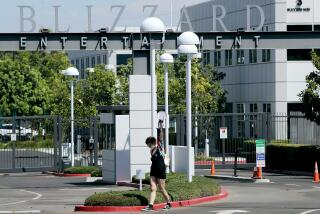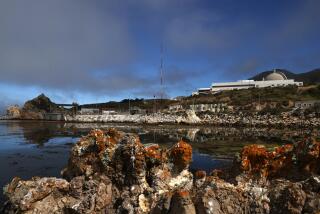Northrop Will Close B-2 Plant in Pico Rivera : Aerospace: Many of the facility’s 7,600 workers will be laid off by mid-1997 when the last of the bombers rolls off the line.
- Share via
In yet another stark example of Southern California’s dwindling industrial might, Northrop Corp. says it will close its sprawling B-2 bomber plant in Pico Rivera, probably in 1997 when the plane’s production nears an end.
It had been widely assumed that many of the plant’s 7,600 workers would be laid off by mid-1997, when the last of the 20 B-2s ordered by the Pentagon is scheduled to roll off the line. But Northrop’s decision dashed any remaining hopes that the 200-acre plant would be saved for another use, even though Northrop has yet to deliver even the first operational B-2 to the Air Force. (Six B-2s are undergoing test flights.)
As a result, Southern California will again suffer the loss of thousands of well-paying industrial jobs--the B-2 workers earn average salaries of about $50,000 a year--and Pico Rivera will again lose a huge slice of its tax base and a key source of spending for local businesses.
Ironically, Northrop saved the plant a decade ago. Ford Motor Co. built an auto factory on the site in 1957, but shuttered the plant in 1980. Northrop bought the property and converted it for the B-2 bomber at a cost of more than $1 billion.
But that was the 1980s, when Northrop was gearing up--with the rest of the aerospace industry--for a major arms buildup during the Reagan years. Now, facing severe post-Cold War cutbacks in military spending, Northrop is following Ford out of Pico Rivera, a blue-collar, largely Latino suburb with about 60,000 residents.
“It’s going to hurt,” said John G. Chavez, a Pico Rivera city councilman. “We thought that since they had invested so much money in the facility, it might be one they would consider keeping.”
Northrop’s Pico Rivera work force shares production of the B-2 with company facilities in Palmdale and at Edwards Air Force Base, where 4,200 additional workers assemble and test the bombers.
The Pico Rivera work force includes engineers, designers, lab technicians and some production employees, who handle such sub-assembly as parts of the B-2’s wings.
Northrop opened the plant at a time when the Air Force was planning to buy 132 of the bat-winged stealth bombers. But the Pentagon budget cuts and ongoing political disputes about the need for the B-2 resulted in the program’s severe cutback. (The cost of each plane is now approaching $1 billion.)
The decision to buy just 20 planes was announced in early 1992, after which Northrop immediately eliminated 1,500 B-2 jobs.
Northrop, which disclosed the plant’s closure in an employee newsletter, said the shutdown will not occur before 1997. But the Los Angeles-based aerospace concern said that “significant reductions” will begin there next year. The company also said it has no plans to find other work for the facility and will sell it.
Dale Shellhorn, B-2 program manager, said in the newsletter that Northrop’s total B-2 work force will drop to about 6,500 by early 1996 and that most of the employees will be in Palmdale.
“The new opportunities we are pursuing will never equal the B-2 program” in terms of employment, Ralph Crosby, a Northrop vice president, said in the newsletter.
Chavez said Northrop’s departure will be an even bigger blow than Ford’s for Pico Rivera, because the plant became part of the city’s redevelopment zone after Northrop arrived. With Northrop’s presence, the city sold $20 million in bonds for redevelopment in the mid-1980s, but selling additional bonds will be nearly impossible with Northrop planning to leave, he said.
Taxes from the plant had also helped finance the area’s redevelopment effort, including a new shopping district along Whittier Boulevard.
Garth Gardner, another city councilman, said Pico Rivera will keep working with Northrop to keep the plant from closing. “It’s to our economic advantage to make sure the property stays viable,” he said.
More to Read
Inside the business of entertainment
The Wide Shot brings you news, analysis and insights on everything from streaming wars to production — and what it all means for the future.
You may occasionally receive promotional content from the Los Angeles Times.











